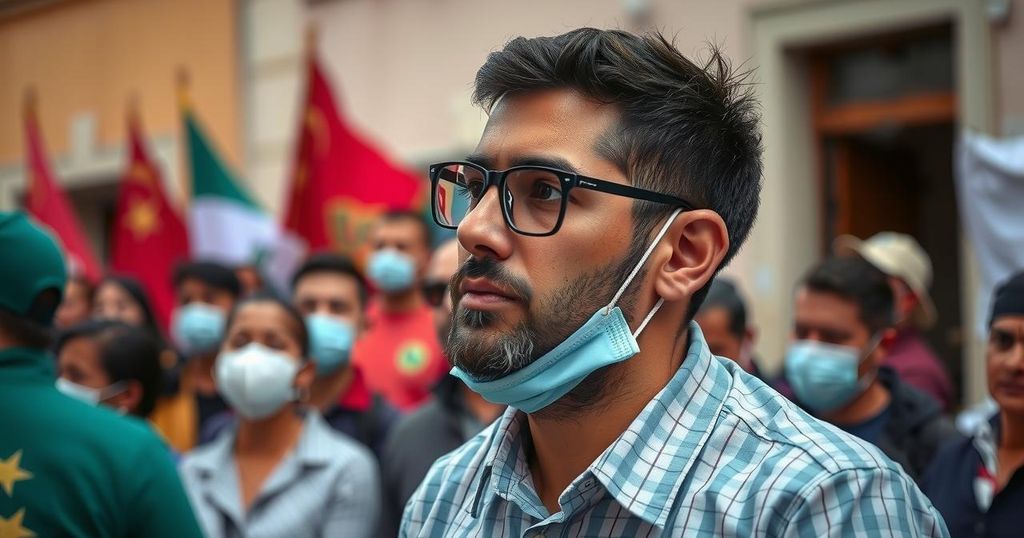Said Ait Mahdi, a Moroccan activist, was sentenced to three months in prison for leading protests against the government’s earthquake response, which resulted in significant fatalities and damage. His arrest has been condemned as politically motivated by human rights advocates, amidst ongoing public outcry regarding the government’s handling of recovery efforts in the earthquake-affected Al Haouz region.
A prominent activist from Morocco, Said Ait Mahdi, has been sentenced to three months in prison for his role in organizing protests against the government’s inadequate response to a devastating earthquake in September 2023. This earthquake, which registered a magnitude of 6.8, resulted in significant destruction in the Al Haouz region, claiming nearly 3,000 lives and causing extensive damage to infrastructure, including homes, schools, and health facilities. Ait Mahdi, who is the president of a leading activist organization in the affected area, faced several charges, including defamation and inciting an unauthorized demonstration, which human rights groups have deemed arbitrary and politically motivated.
Following the earthquake, which exacerbated existing inequities in the region, Ait Mahdi emerged as a vocal critic of the government’s recovery efforts. Demonstrations have been prevalent, with residents criticizing the local authorities for their perceived inadequate management of recovery operations, as many displaced individuals continue to reside in makeshift shelters. Despite the charges he faced, Ait Mahdi’s sentence was shorter than the typical one-year imprisonment for similar offenses, a note made by his attorney, Isaac Charia. However, three of Ait Mahdi’s fellow activists who faced related charges were acquitted during the same period.
The Moroccan Association for Human Rights publicly denounced Ait Mahdi’s arrest, asserting that it was a retaliatory action against him for advocating for the earthquake victims. Numerous NGOs, including the Local Coordination for the Defense of Freedoms, have condemned the charges as attempts to suppress criticism regarding the government’s flawed response to the disaster. In light of these developments, calls for Ait Mahdi’s immediate release have been voiced by various civil liberties groups, illustrating the ongoing tensions regarding freedom of expression and civil rights in Morocco.
This case is particularly significant as it reflects broader issues of governance and the protection of civil liberties in Morocco, especially in regions marginalized by historical inequities. Activist groups have actively protested not only in their local areas but also in major cities, aiming to highlight the delayed recovery efforts and the urgent needs of those affected by the natural disaster. Additionally, the government has pledged substantial financial resources for recovery, yet critics assert that real and meaningful actions must accompany this commitment to aid affected communities.
The case of Said Ait Mahdi highlights growing concerns regarding civil liberties and government response to natural disasters in Morocco. In September 2023, a substantial earthquake struck the Al Haouz region, leading to significant loss of life and infrastructure damage. The earthquake has intensified existing disparities within Morocco, particularly affecting marginalized indigenous communities. Protests have arisen as citizens express dissatisfaction with the government’s recovery efforts, questioning its effectiveness and transparency. The sentencing of an activist like Ait Mahdi sheds light on the tensions between state authority and citizen activism in the face of perceived governmental neglect and mismanagement.
Said Ait Mahdi’s imprisonment underscores the ongoing struggle for civil rights in Morocco, particularly in the context of natural disaster recovery. The reactions from human rights organizations and civil liberties advocates highlight the political implications of his arrest, suggesting a climate of repression against dissenting voices. As Morocco continues to navigate the recovery from the earthquake, the calls for accountability and transparency from citizens and activists will likely persist, emphasizing the need for meaningful action from the government in addressing the concerns of affected individuals.
Original Source: www.independent.co.uk






